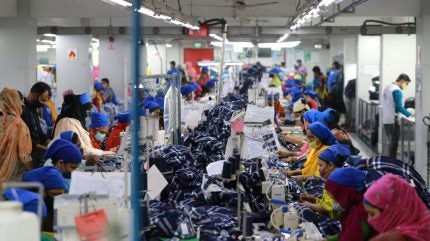
“These are unprecedented times.” Remember hearing that at the turn of 2020 when the reality of the Covid pandemic had begun to sink in and the apparel sector globally suffered from factory closures, logistics complications, and a consumer pullback on store closures? The last few weeks might suggest that those “unprecedented times” were just the start of a new normal.
Once again, the apparel sector finds itself in a pressure cooker situation, where turbulence across the supply chain is filtering across to brands and retailers who are again being forced to find a new normal.
In Bangladesh, the crisis continues to unfold as the country battles mass flooding which has left 59 dead and millions displaced.
While factories are still running, many are unable to get access to raw materials or get their finished goods to ports due to disruption across logistical networks.
But challenges are not only limited to apparel-producer countries as recent news would indicate.

US Tariffs are shifting - will you react or anticipate?
Don’t let policy changes catch you off guard. Stay proactive with real-time data and expert analysis.
By GlobalDataLast week a strike of two of Canada’s largest railways threatened to disrupt apparel trade, with Canada sending around 75% of all its exports to the US mostly by rail.
The strike was ended on order of the Canadian government. But as an appeal is in place to overturn this decision, the apparel industry has warned it is not in the clear yet and that retailers must look to build in slack in terms of delivery times as well as having backup delivery options and alternative modalities to avoid disruptions like this that could impact their ability to conduct business.
Of course, it’s not the first time the fashion sector has witnessed such scenarios. Fashion brands and retailers were forced to rethink their supply operations in 2021 when violence broke out following a military takeover of the government. Concerns over worker welfare saw brands including Benetton, H&M and Bestseller suspend collaborations with suppliers in the country.
And, the aftermath of the pandemic together with strained US-China relations, and increasing scrutiny over China-sourced goods under the Uyghur Forced Labor Prevention Act, has seen brands cut their reliance on China and served key lessons in diversifying their sourcing operations.
We could even go as far as to say we are experiencing unprecedented times in developed countries with wetter summers and longer and warmer winters influencing what consumers buy.
Last week the British Retail Consortium noted UK fashion brands and retailers were slashing prices to clear unsold summer stock. While this may appeal to consumers in the short term, their reaction when prices spike again especially given the UK’s anticipated energy price rise this winter, is yet to be seen.
The moral of the story is that we are always in “unprecedented times”. We’ve had them and will continue to have them. Navigating them is key to survival, for which building things like agility, flexibility and contingency plans into supply chains is key.
It’s impossible to predict climate disasters and wars and the impact they will have on global supply. But it is better to expect them to happen and even plan for them. By spreading supply operations across several locations – some closer to home and others further away – and working with suppliers that can accommodate shorter runs with faster lead times, brands and retailers can minimise disruption to business when such unprecedented times occur, and minimise losses as a result of inventory that doesn’t sell.
As the age-old adage goes: if you fail to plan, you are planning to fail.
Top news stories on Just Style last week…
BGMEA addresses unrest, urges RMG factory owners to pay ‘timely’ wages
The Bangladesh Garment Manufacturers and Exporters Association (BGMEA) held a meeting at its Uttara complex on 27 August to discuss the worker situation in the garment industry, following riots that resulted in the resignation of Prime Minister Sheikh Hasina.
New Look, ITF team to safeguard supply chain worker rights
UK apparel brand New Look has entered into a partnership with the International Transport Workers’ Federation (ITF) to address labour rights issues in its transport supply chain.
Indrajeet Sen takes charge of Puma global sourcing operations
Global sports company Puma appoints Indrajeet Sen, as senior vice president of Puma Group Sourcing, effectively taking over the operational responsibilities of the chief sourcing officer role Anne-Laure Descours who chose not to extend her board contract.
Digitalisation, AI, regulatory challenges to take centre stage at ITMF, IAF conference
The International Textile Manufacturers Federation (ITMF) annual conference and International Apparel Foundation (IAF) World Fashion Convention is set to be held in the city of Samarkand, Uzbekistan from 8-10 September next month.
Explainer: Will the surge of secondhand change fashion?
As Oxfam announces a new partnership with secondhand marketplace Vinted for a show at London Fashion Week this September, are pre-loved pieces becoming the go-to for consumers?
Nextevo CEO: Pineapple fibre is in demand but value-add is key
Pineapple fibre company Nextevo might be a start-up but its CEO has big ambitions following the launch of his first production facility in Vietnam with plans to expand beyond apparel into footwear and incorporate recycled material blends into his existing fibres.
Esprit reduces losses with restructure
Clothing brand Esprit has announced a “significant reduction” of loss for the six months ended 30 June 2023 thanks to its restructure and deconsolidation efforts in its European business.
BGMEA names new president
Bangladesh Garment Manufacturers and Exporters Association (BGMEA)’s President S. M. Mannan (Kochi) has resigned from his role, citing long-term medical treatment, but will continue as a director on the board.



